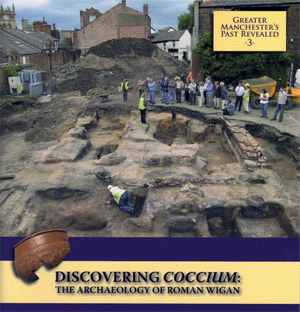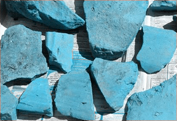
This is the title of our booklet which arrived last month and will be available to all members at our next meeting. It describes the various excavations carried out over the years 'in search of Roman Wigan' and includes the Roman Bathhouse found in Millgate in 2005. It has been expertly written by our friend, Ian Miller, from Oxford Archaeology North, with a small contribution from ourselves.
We have also had a helping hand with the funding by successfully applying for a grant of £1500 from the Community Chest. The booklet is intended as a precursor to a much fuller publication (currently on hold due to the financial difficulties of the Grand Arcade development company). Despite its small size, the booklet contains a complete guide to all the investigations carried out over the last thirty years. It also explains our current understanding of Wigan's role during the Roman period. It is a fantastic effort by Ian and I would like to thank him, on behalf of the Society, for all the hard work he has put in to produce it.
The booklet is published as part Greater Manchester's Past Revealed series which includes 'Uncovering Manchester's Industrial Origins' and 'The Archaeology of the Bury Rock Triangle'. If you would like a copy of our booklet and are unable to attend the meeting, let me know so that I can arrange something for you.
CfAA Events
The Centre for Applied Archaeology (CfAA), based at Salford University, will be running a Field School for Volunteers in August. It is based at a place called Mons Pool near Nottingham and will run for 5 days. The training is free, however there will be a cost of £100 for accommodation and transport. There are 2 dates to choose from, either the week starting the 8th August or the week starting 15th August. If you are interested contact Brian Grimsditch on 0161 295 3821 b.grimsditch@salford.ac.uk or see me at our next meeting for more details.
Heritage Crime is the title of a seminar being held at The Cube in Portland Street Manchester on Friday 24th June between 5pm and 7pm.
Heritage crime includes theft of lead from churches and historic buildings, architectural theft, illegal metal detecting, unlawful alteration and damage to Listed Buildings, damage to Monuments, arson, graffiti, substance abuse and other antisocial behaviour. As well as the physical damage to our heritage, these crimes can be very distressing to owners, heritage agencies and local communities. This seminar will set out the background to a national initiative to combat this crime and, look at a range of case studies of successful prosecutions.
Next Meeting (New Venue)
Wednesday 1st June - however this month we will be meeting in the Pagefield Hotel at the junction of Park Road and Gidlow Lane. This is because Upper Morris Street Club closed its doors earlier this month. Despite the short notice we have been able to secure this new venue (we're in the pool room of this 'Famous' pub - although what it's famous for, I've yet to find out) but we will be starting at the usual time of 7.30 pm. By the way there is a car park at the rear but if it is full, there are usually spaces in the side streets off Gidlow lane.
This month speaker is Michael Higgins from Royton Historical Society who will be giving us a talk on the Royton Hall Project. This community based initiative ran over a number of years ending in 2007, and was centre around Royton which is just north of Oldham. Its aim was to find out more about the lives of the people through the centuries who lived there. It also had the aim of bring the present community together with a better understanding of their local heritage. The main excavations centred on the Jacobean hall which survived until 1939; however the site itself has been occupied since 13th century. It was home to 12 generations of the Byron family, the most famous descendant of which was George Gordon, the 6th Lord Byron. It was even owned at one time during the early 17th century by the Standish family. The project, which started in 2005, was a huge undertaking with 3 main excavations involving over a thousand children and their teachers, 266 adult diggers and other volunteers (and over 3000 visitors).
Funding came from a wide variety of both public and private sources and is a prime example of a very successful community project. Its story is very relevant to our Society as we look to embark on a similar project ourselves, with our involvement with the Dig Greater Manchester project. For more details of the Royton Hall Project you can visit their website at http://www.zen42299.zen.co.uk/new_page_ 9.htm
It's a fascinating story so I hope to see you at the meeting, - BA
|



